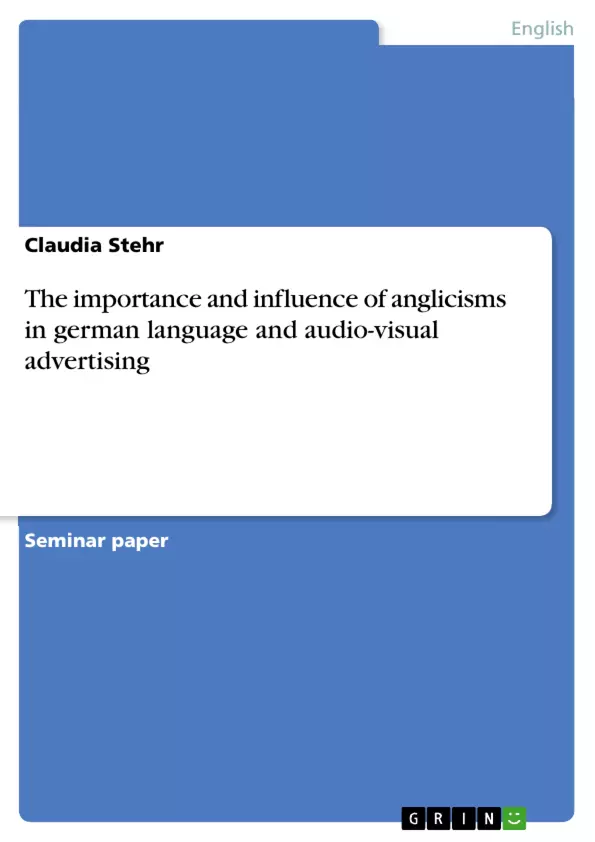Language is not stable, it is a communication system used by human beings. As people and the environment they live in change and develop, it is natural for language to change and to get influenced, as well. The amount of English words in the German language increased highly since 1945 and especially since advertising plays an important role in our society. After the second World War the connection between Germany and the Western world got stronger and more intensive than it had been before. Especially the areas media, literature, music and theatre, but also politics, sports and economy have very high influences on the growing use of English words in German language.
The German Academy of Language in Berlin says that no more than five per cent lexical amount of anglicisms are existing in the German language. That, indeed, is not much, but this does not propose anything about how often these words are used in the every-day language. There are no concrete guidelines or laws about the usage of Anglicisms, and advertising agencies tend to plead that they only orientate on those English words which are already used by Germans. This has to be doubted thinking that the words mail express logistics finance, Stimulating Facial Freshener, or Concentrated Line Smoother are not always understood directly nor by many Germans. But the understanding of Anglicisms will not be the subject of this paper.
In my research paper I want to point out which influence the English language has on the language of advertising and how anglicisms are seen in our society. I refer to the audio-visual media (TV-advertisement) and try to conclude about the importance and influence of Anglicisms in general. In this paper the term Anglicism stands for English and American borrowings, as well.
To supply evidence for my thesis I give and analyse a few examples of advertising spots from the German channel ARD, and I also present my results of a questionnaire about “Anglicisms in the German language” which was filled in by 60 Germans. At the beginning I want to go into the terms “anglicism”, “language of advertising” and I point out the most important reasons for the usage of Anglicisms, to give the reader a clear view in which way these terms have to be looked at and dealt with in this paper.
Inhaltsverzeichnis (Table of Contents)
- Introduction
- The term "Anglicisms"
- Language of Advertising
- Reasons for Anglicisms in German Advertisement
- Analysis of Spots
- Analysis of the questionnaire
- Conclusion
Zielsetzung und Themenschwerpunkte (Objectives and Key Themes)
This research paper aims to investigate the influence of the English language on the language of advertising in Germany and how anglicisms are perceived by German society. The focus is on audio-visual media, specifically television advertisements, with the goal of understanding the importance and influence of Anglicisms in general.
- The increasing use of Anglicisms in German language since 1945.
- The role of advertising in promoting and normalizing Anglicisms.
- The perception of Anglicisms by German consumers.
- The influence of American and English culture on German advertisement.
- The impact of Anglicisms on the German language and identity.
Zusammenfassung der Kapitel (Chapter Summaries)
- Introduction: This chapter introduces the topic of Anglicisms in the German language and their significance in advertising. The author uses a quote from Jil Sander to illustrate the prevalence of Anglicisms and the influence of American/English culture on German language and advertising.
- The term "Anglicisms": This chapter defines the term "Anglicisms" and explores its different forms and categories, including zero-substitutions, partial-substitutions, "Denglish," and pseudo-Anglicisms. The author discusses the history of Anglicisms in the German language and how they have been adopted over time.
- Language of Advertising: This chapter examines the specific use of Anglicisms in German advertising. It explores the reasons behind the increasing use of English words in advertising, highlighting the role of globalization, American cultural influence, and the desire to create a sense of modernity and exclusivity.
- Reasons for Anglicisms in German Advertisement: This chapter delves into the motivations for using Anglicisms in advertising. The author explores the potential advantages and disadvantages of using English words, considering factors like their impact on brand image, consumer perception, and effectiveness in conveying messages.
Schlüsselwörter (Keywords)
This research paper focuses on the following keywords: Anglicisms, German language, advertising, audio-visual media, television advertisements, American culture, cultural influence, consumer perception, globalization, language change, identity.
Frequently Asked Questions
Why has the use of Anglicisms increased in Germany since 1945?
The increase is due to stronger ties with the Western world, the influence of American culture in media, music, and politics, and the rapid globalization of the economy.
What are "pseudo-Anglicisms" in the German language?
Pseudo-Anglicisms are words that look or sound English but are not used with the same meaning in English-speaking countries, or are entirely invented in Germany (e.g., "Handy").
How does advertising influence the use of English words?
Advertising agencies use Anglicisms to create an image of modernity, exclusivity, and internationality, often claiming they only follow existing linguistic trends among consumers.
Do Germans always understand the Anglicisms used in ads?
Research suggests that many complex English terms used in advertising (like "Facial Freshener") are not always directly understood by a large portion of the German population.
What is "Denglish"?
"Denglish" refers to a mixture of German (Deutsch) and English, where English vocabulary or grammar is integrated into German speech patterns.
- Quote paper
- Magistra Artium Claudia Stehr (Author), 2002, The importance and influence of anglicisms in german language and audio-visual advertising, Munich, GRIN Verlag, https://www.grin.com/document/73837



